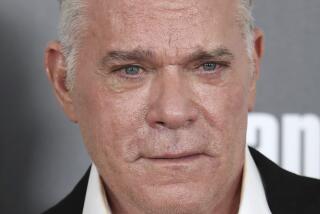The Spectacle of Morality
The American Cinematheque promises a vintage premiere with all the trimmings Friday, when it opens the doors to its permanent home at the restored 1922 Egyptian Theatre on Hollywood Boulevard with a gala, invitation-only screening of Cecil B. DeMille’s original “The Ten Commandments.”
“The Ten Commandments,” which had its premiere at the Egyptian exactly 75 years ago on Dec. 4, 1923, will be shown to the public Saturday at 8 p.m., preceded by a 7 p.m. reception; screenings are also scheduled Sunday at 2 p.m. and Monday and Tuesday at 8 p.m. The film will be presented with the restored original score under the direction of musicologist Gillian Anderson. Artifacts from the sets, long buried in desert sands, will be on display during the film’s engagement.
You can understand why DeMille remade his first religious spectacle 33 years later. In the original version, the Old Testament drama is confined to a prologue that is a timelessly awesome, if simplistic, retelling of the exodus, followed by a contrived modern-day morality play illustrating the evils that befall those who disobey the commandments.
The prologue has tremendous sweep and scale, as Moses (Theodore Roberts) parts the Red Sea, leading his people out of Egyptian bondage only to lose them to the orgiastic worship of the golden calf. (This may be the first flowering of DeMille’s sure-fire blend of religious piety and salaciousness.) But the morality play is another matter, a dated and lurid melodrama about the inevitable comeuppance of a ruthless young San Francisco contractor (Rod La Roque). Yet there is pertinence in the remark of the contractor’s brother to their ultra-religious mother: “You carry a cross in your hand, but you use it like a whip.”
In its overheated way, the contemporary portion of the film does capture the anguish of countless American families in the 1920s as parents and children struggled to reconcile Victorian values with the good-time frenzy of the flapper era. The presence of radiantly beautiful Leatrice Joy as the contractor’s vivacious wife is immensely helpful. (323) 466-FILM.
*
The 15th annual Israel Film Festival, which will present a selection of features, documentaries and TV dramas through Dec. 17 at the Music Hall (9036 Wilshire Blvd., Beverly Hills), opens with Eyal Halfon’s wry, exuberant comedy “Circus Palestina “ tonight at 7:30 p.m. at the Academy of Motion Picture Arts and Sciences. In the film, a Russian circus arrives for an engagement in an Arab village on the West Bank--only to have its lion run loose, increasing tensions between the Arabs and the occupying Israeli forces during the long intifada. Attempting to capture the animal is a sweet-natured Israeli soldier, Bleiberg (Yoram Chatav), eager to earn the respect of the lion’s sultry tamer Mariana (Evgenia Dudina). Meanwhile, the elusive animal wreaks havoc on a car theft enterprise set up by the local Arab community leader and the pompous Israeli commander. Despite English subtitles, “Circus Palestina,” which repeats Dec. 17 as a closing-night benefit, is sometimes hard to follow, but its message of peace and freedom comes across loud and clear.
On opening night, festival founder and director Meir Fenigstein will present its first lifetime achievement award to Lia van Leer, founder of the Jerusalem Cinematheque and the Israel Film Archive.
Julie Shles’ “Afula Express,” also known as “Pick a Card,” is a bittersweet romantic comedy about a hefty mechanic (Zvika Hadar) from a small town in Northern Israel who persuades his pretty, plump girlfriend (Esti Zackheim) to go with him to Tel Aviv, where he intends to pursue his dream of becoming a magician. The hitch is that he hasn’t enough talent to make it on his own, and his successful teaming up with his older pal (Aryeh Moskuna), a noted magician who comes out of retirement, is only an illusion. “Afula Express” has a lot of warmth and passion--and an aura of reality as well. It screens Saturday at 7:30 p.m., Sunday at 4:30 p.m. and four more times in the course of the festival.
Nitza Gonen’s “Family Secrets” unfolds as a conventional melodrama but has a psychological complexity that could have made for a sharper, more stylish film. As it is, “Family Secrets” is absorbing and insightful, involving two cousins (Romi Aboulafia, Michael Hanegbi) drawn to each other more strongly than is healthy. Complicating matters is the presence of their grandmother’s cousin (Eli Cohen), a former opera singer who carries an aura of mystery and a whiff of scandal. He’s clearly gay, but the grandmother remains in total denial of her cousin’s sexual orientation. Marred by a jarringly inappropriate score of unrelenting jauntiness, “Family Secrets,” written by Sherni Zarhin, really calls for a director of the style and sensibility of a Luchino Visconti. The first of its five screenings is Saturday at 10 p.m. (213) 966-4166.
*
The Midnight Special Bookstore (1318 Third Street Promenade, Santa Monica) will hold its monthly “Documental” screenings Saturday, with two different programs, at 7 and 9 p.m.. Screening in the 7 p.m. show is Flavyn Mendoza’s remarkably understated yet candid 58-minute “The Amazing Normal Story,” an impressive example of documentary-making-as-therapy in which Mendoza, now 30, comes to terms with the fact that at age 12 she began a sexual relationship with a 33-year-old neighbor.
Her odyssey of self-discovery and liberation is spiked with ironies--her mother made a student film dealing with child rape that featured Flavyn; her father, by his own on-camera admission, “violated” Flavyn’s older stepsister; Flavyn says that her seducer built her self-confidence and even gave her the video camera that would lead to her becoming a filmmaker. Her confrontation with him later cuts to the heart of pedophilia and, in her case, the stunning absurdity of her seducer’s state of denial--not that the two-year sexual relationship took place, but that a 12-year-old girl was responsible for it commencing in the first place.
The 9 p.m. program features Heather Korb’s 29-minute “Third Ward Blues,” a documentary focusing on the Houston neighborhood and the blues musicians it nurtured, most notably guitarists Albert Collins, Clarence “Gatemouth” Brown, Johnny Clyde Copeland and Joe “Guitar” Hughes. Also screening is Thomas Hilton’s 46-minute “Halo in My Coffee,” a history of Los Angeles’ coffeehouses and the artists, storytellers and musicians who perform in them. (310) 393-2923.
More to Read
Only good movies
Get the Indie Focus newsletter, Mark Olsen's weekly guide to the world of cinema.
You may occasionally receive promotional content from the Los Angeles Times.






